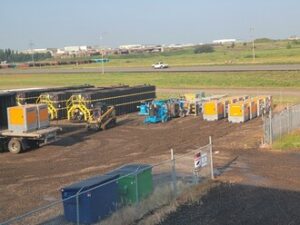
Dewatering across Canada is what NCS Fluid Handling Systems and partners do across Canada.
Dewatering is defined as the intentional removal of groundwater or surface water from a location. Natural evaporation aside, a dewatering process typically involves removing surface or groundwater from the construction site by pumping. In construction, dewatering is essential in creating drier and stable soils for site preparation and foundation excavation by temporarily lowering the surrounding water table.
There are four main types of dewatering systems: wellpoints, sump pumping, eductor wells, and deep wells. Each dewatering method works best for certain excavations and soil types.
Wellpoint dewatering system gets its name because it involves small, individual wellpoints installed around an excavation that connect to a central, centrifugal header pipe with a vacuum function. This helps lower groundwater levels and create a stable, dry area for construction work.
Sump pumping is the simplest and most cost-effective dewatering method. It involves pumping water out of a sump pit that collects water from the surrounding area.
Eductor wells use high-velocity water jets to create a vacuum that draws water out of the ground. This method is best suited for sandy soils.
Deep well dewatering involves drilling a deep well into the ground and installing a submersible pump that can pump water out of the well. This method is best suited for clay soils.
The benefits of dewatering processes are instrumental in prepping construction sites. Dewatering can prevent hazards like mudslides, unstable foundations, and equipment failure due to bogging. It can also aid in keeping employees safe by preventing standing water which can often end up contaminated or cause other erosion concerns in an excavation. Additionally, it increases the risk of worksite injury due to slips and falls.
Incorporating an effective dewatering strategy allows you to keep your construction project on schedule by decreasing unnecessary delays. Excess moisture because of standing water can impact your equipment’s integrity and destroy materials essential for keeping your worksite on schedule. Avoid project delays and budget overages by employing preventative dewatering measures to keep your worksite and equipment storage areas free from excess water.


